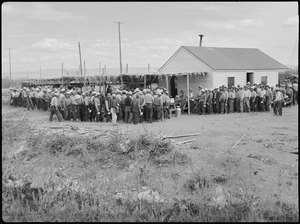Renunciation Act of 1944 facts for kids
 |
|
| Long title | A bill to provide for the loss of United States nationality under certain circumstances |
|---|---|
| Nicknames | Renunciation Act of 1944 |
| Enacted by | the 78th United States Congress |
| Citations | |
| Public law | 78-405 |
| Statutes at Large | 58 Stat. 677 |
| Codification | |
| Acts amended | Nationality Act of 1940 |
| Titles amended | Title 8 |
| U.S.C. sections created | (now ) |
| Legislative history | |
|
|
The Renunciation Act of 1944 was a law passed by the U.S. Congress during World War II. It allowed people living in the United States to give up their U.S. citizenship during wartime. Before this law, you could only lose your citizenship if you were outside the U.S. or convicted of treason.
This law was mainly created to encourage Japanese Americans who were held in special camps during the war to give up their citizenship. The idea was that if they gave up their citizenship, they could then be sent to Japan.
After the war ended, many people who had given up their citizenship under this law tried to get it back. They often argued in court that they had been forced to renounce their citizenship. Most of them were successful in getting their U.S. citizenship restored. The law itself stayed in effect, but it wasn't used much until the 2000s.
Contents
What the Law Said
The Renunciation Act of 1944 didn't have a short, easy name. Its full title was "A bill to provide for the loss of United States nationality under certain circumstances." Sometimes it was also called the Denationalization Act of 1944.
This law added a new way for U.S. citizens to lose their nationality. It said that if the United States was in a state of war, a person could formally write down that they were giving up their citizenship. This had to be approved by the Attorney General (the head lawyer for the U.S. government). The Attorney General would only approve it if it was not against the country's defense interests.
This part of the law was added to the Nationality Act of 1940. Over the years, as other immigration laws changed, the exact section number for this rule moved around in the law books.
How the Law Was Made
Before this law, you could only give up U.S. citizenship if you were outside the country. In late 1943, Attorney General Francis Biddle suggested changing the law. He wanted to allow people inside the U.S. to give up their citizenship.
Biddle and the Justice Department wrote the bill. They worked hard to get Congress to support it. They believed that between 1,000 and 3,000 Japanese Americans might give up their citizenship under this new law. The Justice Department saw this as a way to keep Japanese Americans who were suspected of disloyalty in custody. They worried that courts might say it was against the law to keep U.S. citizens in camps. They hoped that some Japanese Americans would choose to give up their citizenship, which would allow the government to keep them detained until they could be sent to Japan.
Representative A. Leonard Allen introduced the bill in the House of Representatives on February 1, 1944. The House Committee on Immigration and Naturalization quickly approved it.
When the bill was discussed in the House, some representatives from the West Coast thought it wasn't strong enough. They wanted the law to apply to people who had supposedly given up citizenship even before the bill became law. However, other representatives, like Samuel Dickstein, argued that Congress could not take away citizenship from people born in the U.S. The amendment to make the law apply to past actions was voted down.
The bill then passed the House on February 23. The Senate also approved it on June 23. Senator Wallace H. White, Jr. said that they hoped many Japanese people would use the law to give up their citizenship. This would allow them to be exchanged for American citizens held in Japan. President Franklin D. Roosevelt signed the bill into law on July 1, 1944.
Giving Up Citizenship During World War II

The Justice Department started putting the new law into action in October 1944. People in the internment camps who wanted to give up their citizenship had to fill out a form. On the form, they had to state that they understood they would lose all their rights as U.S. citizens. After that, there would be a meeting to decide if the Attorney General would approve their request. If approved, they received a "Notice of Approval of Renunciation."
Many people who gave up their citizenship later faced criticism from others in the Japanese American community. This was because they had made that choice during a very difficult time. These decisions to renounce citizenship have been very controversial. Some people who supported the internment camps said that these renunciations proved that Japanese Americans were "disloyal."
However, many historians disagree with this idea. They point out that the small number of people who gave up their citizenship were being treated unfairly by their own government. They had been forced to leave their homes and jobs. They were put in camps just because of their race.
One person, Minoru Kiyota, who gave up his citizenship and later regretted it, said he only wanted to show his anger at the U.S. government. He felt he had been forced to make the decision because of the stress and intimidation he faced in the camps.
Many people who had given up their citizenship later received help from lawyer Wayne M. Collins. He helped them reverse the government's decision. In 1967, the Justice Department made it easier for people to get their citizenship back without going to court. They could just fill out a form to ask for their renunciation to be canceled. However, not everyone wanted their citizenship back. For example, Joseph Kurihara chose to move to Japan and lived there for the rest of his life.
Later Legal Challenges
After World War II, there were some legal questions about the Renunciation Act of 1944.
What "State of War" Means
One question was about the meaning of "state of war." Congress passed a resolution in 1947 saying that the state of war from World War II officially ended on July 25, 1947.
For a long time, the government believed that the U.S. was not in a "state of war" during conflicts like the Vietnam War. This meant that people could not use the 1944 Act to give up their citizenship during those times.
However, in 2010, a federal court ruled that the U.S. was indeed in a "state of war" in 2004 and 2008. This ruling meant that the 1944 Act could potentially be used by people wanting to give up citizenship during ongoing conflicts. The Justice Department tried to appeal this decision but later dropped their appeal.
Having to Give Up Citizenship in Person
In 2011, some U.S. citizens asked the United States Citizenship and Immigration Services (USCIS) about giving up their citizenship under the 1944 Act. USCIS told them they had to appear in person for an interview at a USCIS office. However, because these people were in prison, they could not go to an interview.
Two people filed lawsuits about this. The courts generally agreed with USCIS. They said that the law requires the agency to check if a person is giving up citizenship willingly. The courts found that the in-person interview was a reasonable way to do this, even if it made it difficult for people in prison.
Having to Leave the U.S. After Giving Up Citizenship
In another case in 2012, a man named Alan Horowitz, who was a citizen of both the U.S. and Israel, wanted to give up his U.S. citizenship. USCIS told him he needed to show that he could leave the United States immediately after his request was approved.
However, Horowitz had just been released from a New York state prison. Because of his situation, he was required to stay in custody or go to a treatment facility. He could not simply leave the country. He argued that this was unfair compared to how non-citizens were treated. The courts disagreed, saying that lawful imprisonment limits many rights.
Proposed Changes to the Law
In 2013, a new immigration reform bill was proposed in Congress. This bill included a section that would remove the part of the law that allows people to give up citizenship during wartime. This change was meant to "prevent criminals from renouncing citizenship during wartime." The bill passed the Senate but did not become law.
 | William L. Dawson |
 | W. E. B. Du Bois |
 | Harry Belafonte |



